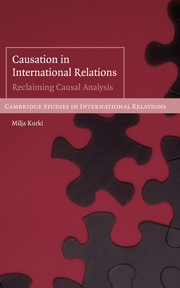Book contents
- Frontmatter
- Contents
- List of figures
- Acknowledgements
- Introduction: the problem of causation and the divided discipline of International Relations
- Part I The Humean philosophy of causation and its legacies
- 1 The Humean philosophy of causation and its legacies in philosophy of science
- 2 Controversy over causes in the social sciences
- 3 Humeanism and rationalist causal analysis in International Relations
- 4 Reflectivist and constructivist approaches in International Relations: more cases of Humeanism
- Part II Rethinking the concept of cause
- Part III Reconfiguring causal analysis of world politics
- References
- Index
- CAMBRIDGE STUDIES IN INTERNATIONAL RELATIONS
3 - Humeanism and rationalist causal analysis in International Relations
Published online by Cambridge University Press: 22 September 2009
- Frontmatter
- Contents
- List of figures
- Acknowledgements
- Introduction: the problem of causation and the divided discipline of International Relations
- Part I The Humean philosophy of causation and its legacies
- 1 The Humean philosophy of causation and its legacies in philosophy of science
- 2 Controversy over causes in the social sciences
- 3 Humeanism and rationalist causal analysis in International Relations
- 4 Reflectivist and constructivist approaches in International Relations: more cases of Humeanism
- Part II Rethinking the concept of cause
- Part III Reconfiguring causal analysis of world politics
- References
- Index
- CAMBRIDGE STUDIES IN INTERNATIONAL RELATIONS
Summary
Chapters 1 and 2 have sought to demonstrate that Humean assumptions have played a central role in the twentieth-century philosophy of science and philosophy of social science. The focus now turns to the analysis of a specific social science discipline, International Relations (IR). The discipline of IR developed in response to the First World War: its guiding task was to analyse the nature of international politics and the causes of wars between states, with the aim of devising solutions to the problems of international interaction. For much of the twentieth century IR theorising has been dominated by two main schools of thought: the political realists, who argue that war between states is an ever-present condition of international politics – owing either to the self-interested nature of human actors or states, or to the ‘anarchic’ nature of the international system – and the liberals, who argue that war between states can be moderated, regulated or even overcome through various means such as institutionalisation or economic interaction. While the so-called first debate and the 1970s inter-paradigm debate in IR revolved around these positions and their various permutations, another divide has also characterised IR theorising: there have been deep disagreements between those who see the discipline of IR as one involving a historical or interpretive analysis of world political processes and those who have sought to make the discipline ‘scientific’ by enforcing systematic methods of empiricist or positivist science on IR research.
- Type
- Chapter
- Information
- Causation in International RelationsReclaiming Causal Analysis, pp. 88 - 123Publisher: Cambridge University PressPrint publication year: 2008

